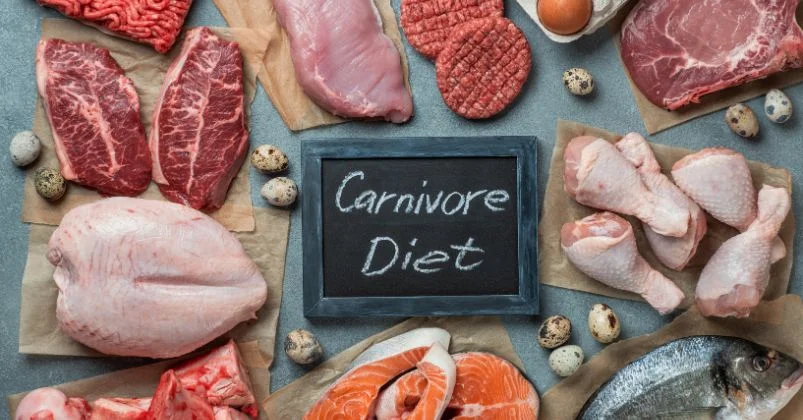Carnivore Diet: Weight Loss Strategy Of Our Ancestors
The carnivore diet is a controversial eating plan that has recently gained popularity. It requires consuming only animal products, such as meat, fish, dairy, and eggs, and precluding all plant-based produce. Proponents of the carnivorous diet claim that it can contribute to weight loss, enhance athletic performance, and improve overall health.
But is the carnivore diet safe and effective? This article will explore the science behind the carnivore diet and its potential benefits and risks.
First Of All, What Is A Carnivore Diet?
The carnivore diet is a dietary pattern that consists of only animal products such as animal meat, fish and certain animal-derived foods like dairy products and eggs. This diet eliminates all plant-based foods, including vegetables, fruits, nuts, grains, and legumes. The carnivore diet is called the “all-meat diet” or the “zero-carb diet.”
Proponents of the carnivore diet believe that it can lead to improved health and wellness by providing the body with all the necessary nutrients and eliminating the need to digest complex carbohydrates. It is also claimed that it can help with weight loss, improve athletic performance and resolve certain medical conditions. However, there is no scientific evidence to back it up.
At the same time, it is also of extreme importance to bear in mind that most healthcare providers do not encourage this type of diet as it lacks crucial dietary fibers, vitamins, and minerals that are mostly found abundantly in plant-based foods. It could also complicate underlying health issues if not monitored properly.
Can You Reduce Weight With A Carnivore Diet?
Some anecdotal evidence suggests the carnivorous diet may help with weight loss. This is because it typically leads to calorie restriction, as meat and other animal products are more calorie-dense than plant-based foods. Furthermore, consuming high protein and fat content through this diet may also promote feelings of fullness, thereby assisting in sticking to a calorie-controlled diet.
However, it's noteworthy that weight loss is a complex process that devolves on various factors, including overall calorie consumption, physical activity/exercise, and genetics. For instance, if you eat up more calories than you burn, you will not lose weight. Hence, weight loss is not solely dependent on any particular diet.
It is also worth remembering that the carnivore diet is rich in saturated fat and cholesterol. It is unsuitable for people with certain underlying medical conditions, including heart disease or high cholesterol. Long-term adherence to this diet could also lead to deficiencies in essential nutrients such as fiber, vitamins, and minerals, which are essential for overall health.
Carnivore Diet Foods
As we said earlier, the carnivore diet consists of only meat that “flies, swims and walks.”
Foods that are allowed on the Carnivore Diet:
- Chicken, beef, turkey, pork, lamb, and other meats
- Fish and seafood, such as tuna, salmon, sardines, lobsters, crab, and shrimp
- Eggs
- Animal-derived products, such as milk, butter, and cheese
- Organ meats, such as kidney and liver
Foods that are prohibited on the Carnivore Diet:
- Vegetables
- Fruits
- Grains or cereals, such as rice, wheat, and oats
- Legumes, such as lentils, beans, and peanuts
- Nuts and seeds
- Sugars and sweeteners
How To Follow Carnivore Diet Foods
If you want to follow the carnivore diet, it's recommended to:
- Start with lean cuts of meat and gradually increase the fat content as your body adapts to the diet.
- Include a variety of meats and organ meats to ensure you get a range of nutrients.
- Consume eggs and dairy products in moderation, as they are high in cholesterol.
- Avoid processed meats, such as sausages and bacon, and foods that contain added sugars and preservatives, which can be detrimental if consumed in large amounts.
Remember, the carnivore diet can be difficult to follow, as it eliminates many foods commonly consumed in a standard diet. It may also be challenging to meet your nutritional needs on such a restrictive diet, especially regarding fiber, vitamins, and minerals typically found in plant-based foods.
Hence, it is important to ensure that you are consuming a variety of animal products to balance essential nutrients, such as iron, vitamin B12, and omega-3 fatty acids. It is also essential to keep hydrated and drink plenty of water, as the carnivore diet can dehydrate.
Carnivore Diet Results (30 Days)
The results of following a carnivore diet for 30 days can vary greatly depending on an individual's starting point, diet adherence, and overall health. Some people may experience positive impacts such as weight loss and increased energy levels. However, if it is not followed properly, there can be negative consequences on health.
Potential Positive Results include:
- Weight Loss: Some people may notice weight loss since consuming foods rich in protein and fat can enhance feelings of fullness. It may help decrease overall calorie intake and weight loss.
- Improved Athletic Performance: Certain animal products are high in protein, and consuming them regularly can support muscle growth and repair. Regularly consuming a carnivore diet could lead to improved athletic performance.
- Resolution of Certain Medical Conditions: Some people have claimed to experience improvements in certain health conditions, such as autoimmune and mental disorders, while on a carnivore diet.
Potential Negative Results include:
- Nutritional Deficiencies: Lacking essential nutrients, like vitamins, minerals, and fiber, typically found in plant-based foods may increase the risk of digestive and kidney disease.
- Increased Risk of Heart Disease: Consuming a diet rich in saturated fat and cholesterol may increase the risk of heart-related diseases and other cardiovascular conditions.
- Constipation: Lack of fiber can cause constipation.
- Increased Risk of Kidney Stones: Consuming high protein diets may increase the risk of kidney stone development.
Before proceeding with the carnivore diet, it's better to consult a healthcare professional or dietician to ensure it is suitable for you and your personal health goals. It's also important to be mindful that any results achieved in 30 days may not be sustainable in the long term.
Benefits Of Carnivore Diet
The carnivorous diet, aka a meat-based diet, may offer several potential benefits, including:
- Adequate Protein Intake: Meat is a rich source of high-quality protein, which is necessary for building and maintaining muscle mass, as well as other bodily functions.
- Iron and B12: Animal-derived products are good sources of iron and B12. These are required to maintain healthy blood and nerve function.
- Fat and Energy: Animal-sourced foods have healthy fats, which are important for maintaining energy levels and overall health.
- Easier to Digest: Some people have claimed that a carnivorous diet is easier to digest than a plant-based diet.
- Effective for Weight Loss: A carnivorous diet can be an effective weight loss plan since it contains low to zero carbohydrates and high amounts of protein and fat. Consuming this diet may lead to a feeling of fullness and satiety.
Potential Risks Of Carnivore Diet
Though the carnivore diet offers several benefits, it also has associated risks. Some of the potential risks of adopting a meat-based diet include the following:
- High Saturated Fat Content: Red meat and processed meats are sources of high saturated fat, which, when consumed regularly, can increase the risk of heart disease and stroke.
- Lack of Fiber: Meat products contain low fiber, which is a crucial element for maintaining a healthy digestive system. A diet lacking in fiber may lead to constipation, bloating, and other digestive problems.
- Lack of Essential Vitamins and Minerals: A meat-based diet doesn't contain essential vitamins, micronutrients, and minerals such as vitamin C, vitamin K, and folate necessary for some bodily functions. These vitamins and minerals are mainly found in fruits, vegetables, whole grains, and other plant-based produce.
- Increased Risk of Cancer: Ingesting large amounts of red and processed meats has been shown to raise the risk of certain types of cancer, such as colon cancer.
- Environmental Concerns: Raising stock (animal agriculture) substantially contributes to ecological issues, such as greenhouse gas emissions, water pollution, and deforestation.
Having a balanced diet of meat, fruits, vegetables, nuts, legumes, and other derived products from plants and animals will help provide essential nutrients and fiber to our body to function properly and maintain health and wellness.
It's worth noting that a well-rounded diet that includes a variety of foods, including fruits, vegetables, whole grains, and lean protein sources, can provide a balance of essential nutrients for overall health and help mitigate some of the risks associated with a carnivorous diet.
Is A Carnivorous Diet Worth It?
Whether a carnivorous diet is worth it depends on various factors, including an individual's personal health goals, dietary restrictions, and overall health status.
A carnivorous diet consisting of meat can offer benefits such as adequate protein intake, high bioavailability of nutrients, satiety, and increased energy levels. However, it also comes with potential risks such as high blood pressure, increased risk of heart disease, cancer, nutritional deficiencies, and environmental concerns. People with pre-existing medical issues definitely shouldn't try a carnivore diet.
It's noteworthy that individual nutritional requirements vary, and what befits one person may not work for another. It's always wise to consult a healthcare provider or a dietician before making any significant changes to your diet to ensure that it is safe and appropriate for you.
Moreover, it's important to consider the ethical, environmental, and sustainability aspects of consuming meat. A carnivorous diet can significantly impact the environment if the meat is not produced sustainably.
FAQs
A: A carnivorous diet, also known as a “carnivore diet,” is a dietary approach that includes only animal products such as meat, fish, eggs, and dairy. It eliminates all plant-based foods, including fruits, vegetables, grains, and legumes.
A: Proponents of the carnivorous diet claim that it can lead to weight loss, improved energy levels, and better overall health. Some also believe it can help with autoimmune diseases and neurological disorders.
A: A carnivorous diet can be high in saturated fat and cholesterol, increasing the risk of heart disease. It may also lack essential nutrients in plant-based foods, such as fiber, vitamins, and minerals.
A: Before starting a carnivorous diet, you must discuss it with your doctor or a registered dietitian. Choosing high-quality, grass-fed, and sustainably raised animal products is important. It's also important to ensure that you get enough essential nutrients, such as vitamin B12 and iron.
A: A carnivorous diet may not be suitable for everyone, especially for vegetarians, vegans, and people with certain health conditions such as high blood pressure, gout, kidney disease, or iron overload disorder. It's also not suitable for athletes or people who engage in heavy physical activity, as a diet high in animal protein may not provide enough carbohydrates to fuel intense exercise.
References
https://www.verywellfit.com/carnivore-diet-pros-cons-and-meal-plans-6754671
https://www.forbes.com/health/body/what-is-the-carnivore-diet/
https://health.clevelandclinic.org/the-carnivore-diet/
https://www.healthline.com/nutrition/carnivore-diet#what-it-is
https://www.everydayhealth.com/diet-nutrition/diet/carnivore-diet-benefits-risks-food-list-more/








